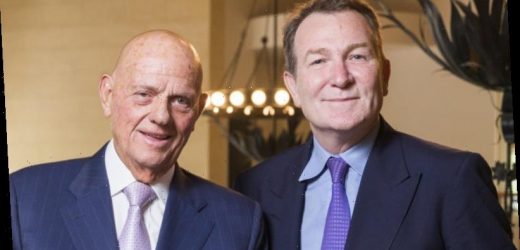When the pandemic hit, billionaire Solomon Lew was quick to plead for government assistance. In one telephone call, he reportedly cried when asking Treasurer Josh Frydenberg to establish the JobKeeper program. Lew’s firm, Premier Investments, temporarily shut down many of its stores, including Smiggle, Dotti, Portmans and Just Jeans. The company applied for JobKeeper and ultimately received more than $40 million in taxpayer assistance.
Premier Investments’ CEO Mark McInnes and chairman Solomon Lew had a very profitable year. Credit:Paul Jeffers
Then Lew’s business came roaring back. Stores reopened and online sales boomed. In 2020, Premier Investments made a bigger profit than it had in 2019. The company paid shareholders $57 million in dividends. As the largest shareholder, Lew himself received more than $20 million.
Despite receiving a handout from the taxpayer, Premier Investments also paid its chief executive Mark McInnes a $2.5 million bonus, taking his total pay packet to more than $5 million.
This month, shares in Premier Investments shot to a record high.
Nobody begrudges Premier their surging revenues. Labor strongly supports businesses in making profits. The success of businesses is a necessary foundation for job creation. Especially at a time when the economy is struggling, it’s good to hear that some firms are performing strongly.
But the big question is: should Solomon Lew pay the taxpayer back?
It isn’t just me who thinks Premier Investments has already stepped out of line. Almost half of Premier’s shareholders voted against the remuneration report in December, a backlash that could trigger a spill of the board if repeated this year.
The Business Council of Australia says that it doesn’t believe companies that receive JobKeeper should be paying executive bonuses. The practice has also been criticised by the Australian Taxation Office and by former Victorian Liberal premier Jeff Kennett.
These critics recognise the basic economic reality that while JobKeeper must be passed on to workers, it also provides relief to the company’s bottom line by covering part of the firm’s wage bill. If a firm has enough spare cash to give the boss a multimillion-dollar bonus, it doesn’t need taxpayer subsidies to pay its workforce.
And there’s a good precedent for giving the subsidies back. Last week, Toyota Australia returned taxpayers $18 million in JobKeeper payments. The company acknowledged there was no legal obligation for them to do it. But chief executive Matthew Callachor said that the board and management had decided that "returning JobKeeper payments was the right thing to do as a responsible corporate citizen". This week, Super Retail Group, which owns Rebel and BCF, announced that its stores had turned a healthy profit, so the firm would repay $1.7 million in JobKeeper subsidies.
The contrast between these principled companies and Premier Investments goes to a central question: who do firms serve? One view, the shareholder theory of value, holds that companies exist only for shareholders. As free-market economist Milton Friedman put it: "There is one and only one social responsibility of business — to use its resources and engage in activities designed to increase its profits." Any other form of social responsibility, Friedman argued, was a misuse of shareholder money.
During the Gordon Gekko era of the 1980s, the shareholder theory of value had plenty of adherents. But these days, it has become increasingly discredited. Thoughtful managers now realise that firms must serve their customers, employees and the broader community. Even the most miserly put up a pretence of caring. No modern company would dare tell the public that its corporate social responsibility policy was "to make as much money as possible".
Yet corporate social responsibility isn’t just about tossing a few bucks to charity. It’s also about making the tough ethical calls, as Toyota Australia and Super Retail Group have done.
This is even more important at a time when 2 million Australians are jobless or wanting more hours of work. Amidst a pandemic and an economic slump, there’s no shortage of demands on the government purse, from helping disadvantaged students to tackling the mental health challenge. Indeed, there’s a real danger the Morrison government will cut off the JobKeeper program prematurely, causing layoffs and insolvencies before the recovery takes root. For many at risk of sinking underwater, JobKeeper has been a lifeline.
As for Australia’s billionaires, they’ve had a remarkable year: 2020 saw the combined wealth of Australia’s billionaires jump by a jaw-dropping 52 per cent. At a time when battlers are struggling, billionaires are swaggering.
Solomon Lew isn’t the only Australian billionaire to have benefited from JobKeeper. Gerry Harvey (Harvey Norman), Jack Cowin (Dominos), Nigel Austin (Cotton On) and James Packer (Crown) also own substantial stakes in companies that received JobKeeper assistance and paid out multimillion-dollar dividends.
Some decisions in life are hard. But for Premier Investments this should be an easy one. Time to pay it back.
Andrew Leigh is the shadow assistant minister for Treasury. www.andrewleigh.com.
Start your day informed
Our Morning Edition newsletter is a curated guide to the most important and interesting stories, analysis and insights. Sign up to The Sydney Morning Herald’s newsletter here, The Age’s here, Brisbane Times’ here, and WAtoday’s here.
Most Viewed in National
Source: Read Full Article



